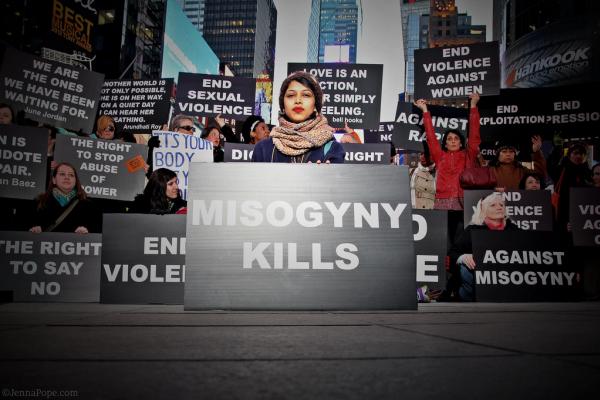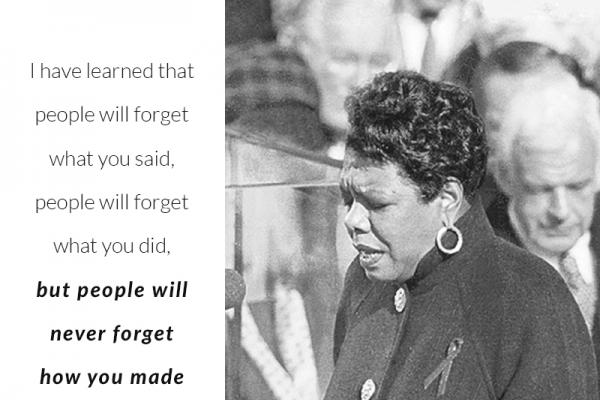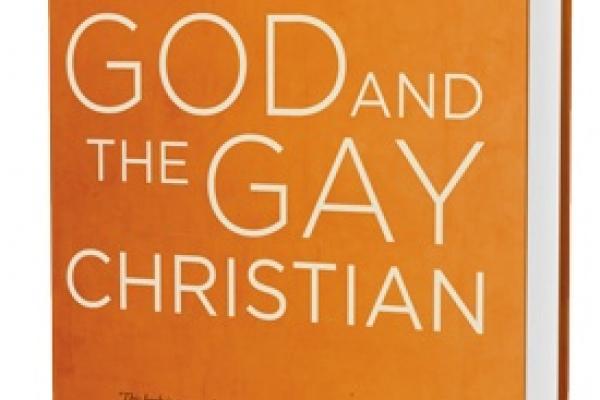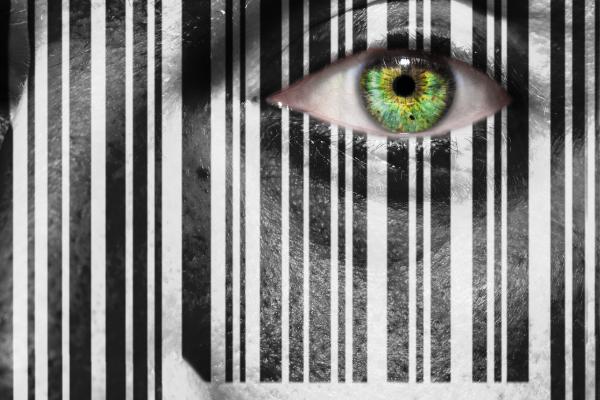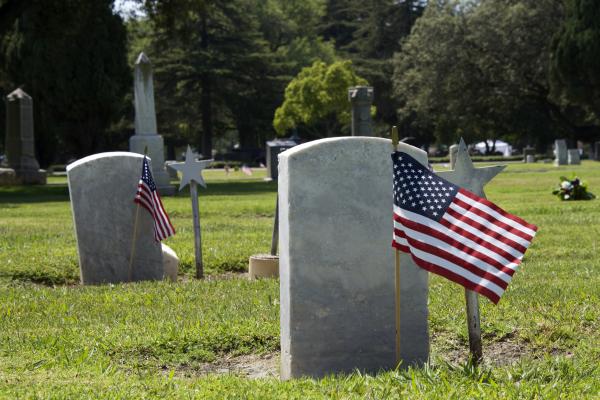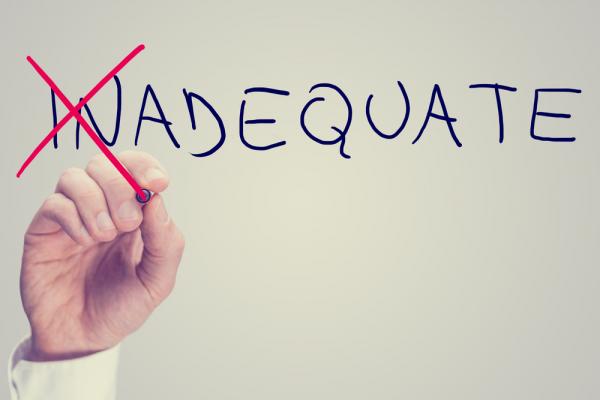To my fellow men,
I’m sure you are as heartbroken as I am about the killings at UC Santa Barbara by a troubled young man with a misogynistic manifesto. Heartbroken for the community, for the families who lost loved ones, and even for the young man who felt like there was no other way.
Now I’m not much of a “Tweeter” (is that the right word?), but I heard that a group of us has taken to defending ourselves on Twitter with the hashtag #NotAllMen. They want to say that that #NotAllMen sexually assault women. #NotAllMen expect a date to be reciprocated with sex. #NotAllMen harass women for the way they do or don’t look at us. They want to say that we’re not like those other people, that we respect women as equals, not demean them as prizes or products.
Who cares?
When I heard the news I wept.
“Renowned Poet and Author Maya Angelou Dies at 86,” read the NBC News headline.
My fruitless effort to hold back tears was proven vain as I made my way into the bowels of a D.C. Metro station — tears streaming. I felt silly.
“Why am I crying,” I thought. “I didn’t know Maya Angelou.” I met her once, but she wasn’t family or a close friend, yet I was reacting with the same profound sense of loss, as if my own beloved great grandmother had passed?
The New York Times called her a “lyrical witness of the Jim Crow South” in the headline that announced Ms. Angelou’s death this morning. But for nearly four decades Dr. Maya Angelou served as a kind of great grandmother of the African-American community — a bridge between the ancestors and us.
Matthew Vines has done us an incredible service by writing his book God and the Gay Christian: The Biblical Case in Support of Same-Sex Relationships. Matthew’s book is an articulate and engaging argument for Christians to support same-sex relationships. It is a great book and I highly recommend it to anyone interested in debate over Christianity and the support of same-sex relationships.
I appreciate this book for primarily two reasons. First, Matthew presents scholarship on the topic in a thoughtful way that won’t bore you to death. If you’ve already done your homework on the topic you probably won’t find anything new, but by reading this book you will encounter scholarly arguments in an engaging way. There are other books on the topic, of course, but what makes Matthew’s book different than most of them is that this is an engaging page turner.
Matthew skillfully debunks many of the arguments against same-sex marriage throughout the book and replaces them with arguments to support same-sex marriage. He not only takes a look at the biblical “clobber texts,” the six passages in the Bible often used to denounce same-sex relationships, but he also takes a look at the historical and cultural context of the ancient world’s view of sexuality. His argument is convincing. I encourage you to buy the book for yourself and for anyone you know who is open to hearing his side of the debate.
When our church receives new members, we share a covenant that includes the commitment to “journey together.” Often, we realize this can mean ‘journeying’ into unwanted, dark, difficult, or surprising places with each other. We have stood with each other as loved ones pass away. We stand with each other in the difficult role of being children of aging parents, or parents of growing children. We bear witness to the power of hope when someone we love struggles with depression. We celebrate commitments made, successes honored, and loves found. The Christian faith, we realize, is rarely about solutions; it is about the authentic and real journey of life and a common trust that our God walks with us, no matter what.
For a variety of reasons, a former bishop in another denomination found us in the immediate aftermath of a horrible car accident that resulted in the death of an innocent and lovely woman in a nearby community.
Rather than becoming a setting to explore the details of this accident, our congregation became a lifeline for him during the months he awaited his fate and eventual conviction of second-degree reckless homicide. Week in and week out, he attended worship, sang with us, prayed with us, and sought spiritual solace with us. His presence was quiet but consistent. He didn’t ask for special attention, indeed didn’t want to make us uncomfortable with his presence. As a person of faith on his own difficult journey, he simply wanted to be in worship with a community.
James' assertation that "Religion that God our Father accepts as pure and faultless is this: to look after orphans and widows in their distress"(1:27) is nothing new in the church. This verse gets pulled out on service days and when seeking funds for short-term mission trips. Its widespread usage makes it easy for us to see the orphan and widow as abstract conceptions. At best they are just another good we should do and at worst, we see them as an outdated notion that does not really apply to the modern American church.
However, the plight of these two underrepresented and often ignored groups — women and children — has modern impacts. These two tell the tale of human trafficking today. Human trafficking is an emerging human rights issue both globally and in the United States. With an estimated 14,500 - 17,500 trafficked through the U.S. each year, it is essential for the church to take notice. The orphan and widow make up the majority of human trafficking survivors.
Maya Angelou, a renowned author, poet and civil right activist, has died at 86. Angelou, know for her autobiography I Know Why the Caged Bird Sings, also authored six other autobiographies along with numerous collections of poems.
Throughout her career, Angelou she was active in the Civil Rights movement, working with Martin Luther King, Jr. and Malcolm X. She also served a one point as the Northern Coordinator for the Southern Christian Leadership Conference, a group founded following the Montgomery Bus Boycott by Dr. King and others.
NBC News reports her numerous achievements:
Angelou was born on April 4, 1928, in St. Louis, Missouri, under the name Marguerite Annie Johnson. She grew up to become a singer, dancer, actress, writer and Hollywood's first female black director.
Angelou had an impressive list of accolades: She was a three-time Grammy winner and was nominated for a Pulitzer, a Tony, an an Emmy for her role in the groundbreaking television mini-series "Roots."
I am sweating on the treadmill when a young man walks onto the patio outside my window, sits at a table, and spreads out his drug paraphernalia.
He folds a piece of white paper to form a work surface. He measures a brown, leafy substance onto the paper, then, using a subway fare card, mixes in a white powder.
Next he puts half of his pile into a cigarette paper and carefully rolls it into cylinder shape. Now he rolls the other half. Both joints go into a plastic medicine bottle.
Off he goes down a stairway, pausing to light up, then on to his apartment in an adjacent building.
The moral calculation is that not a single one of the people around him matters at all. This is the casual face of anomie, the breakdown of moral guidance and resulting alienation from society.
Monday was Memorial Day, full of family trips and events, lots of picnics and barbecues with friends and neighbors, and a national day off from school and work. For us it was the Northwest Little League All Star game here at Friendship Field in Washington D.C., a family tradition for many years. My wife Joy, the Commissioner, organized the game day, including a wonderful picnic on a glorious baseball day for players, parents, relatives, and many fans – with 300 hotdogs!
It was also a day to remember all the people who have died in America’s wars. For the families of those war victims and so many of their fellow veterans it was a day of remembering and mourning. In the quiet moments of listening to the national anthem while looking at the American flag, our little baseball crowd with hats off might have been thinking about the meaning of the national holiday. But right afterward it was “Play Ball.”
On Memorial Days I always end up listening to the many stories from the families who lost their most beloved ones and from the veterans whose eyes still tear up when they recall their dearest buddies lost on battlefields far away.
Every time I go to restock my face cream at the cosmetics vendor, inevitably the sales ladies point out the fact my skin is particularly dry. Oh wait, not just dry, they say, they are also seeing signs of crow’s feet and — gasp! — some dark circles under my eyes. They masquerade as skincare health professionals with fancy dermatology equipment to properly diagnose the ills of my skin. All this, of course, so they can sell me the magic anti-wrinkle cream. And do I buy it? I do. (Dang it, you weak-willed creature.)
I recently read a book titled, Winning the Story Wars by Jonah Sachs, who pinpoints this trend over the last hundred years of advertising coined “inadequacy marketing.” He summarizes this form of storytelling as follows:
“Inadequacy stories encourage immature emotions like greed, vanity, and insecurity by telling us that we are somehow incomplete. These stories then offer to remove the discomfort of those emotions with a simple purchase or association with a brand.”
The first step in adequacy marketing is to create anxiety.
Will the United Methodist Church soon have to drop the “United” part of its name?
A group of 80 pastors is suggesting that the nation’s second-largest Protestant denomination is facing an imminent split because of an inability to resolve long-standing theological disputes about sexuality and church doctrine.
But more than lamenting the current divisions, the pastors indicated there is little reason to think reconciliation — or even peaceful coexistence — could be found. Like a couple heading to divorce court, the pastors cited “irreconcilable differences” that can’t be mended.
“We can no longer talk about schism as something that might happen in the future. Schism has already taken place in our connection,” said the Rev. Maxie Dunnam, a retired president of evangelical Asbury Theological Seminary in Kentucky, who joined the statement.
